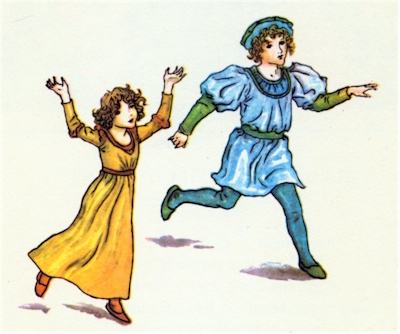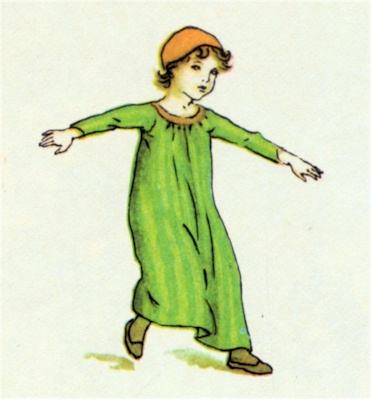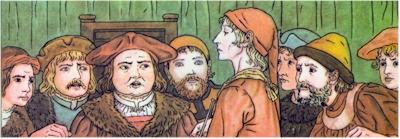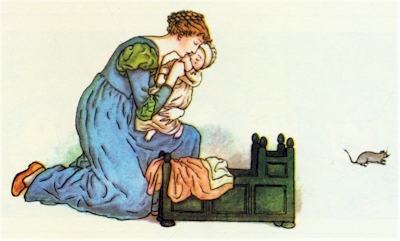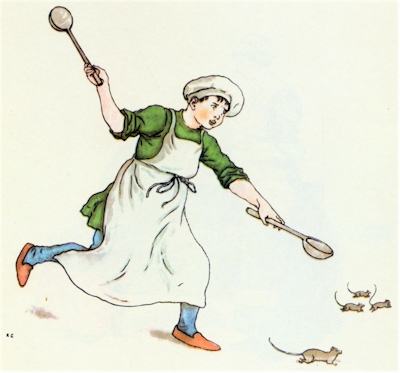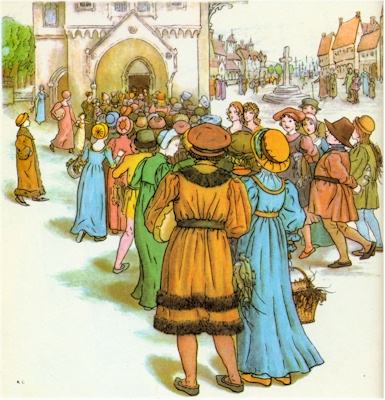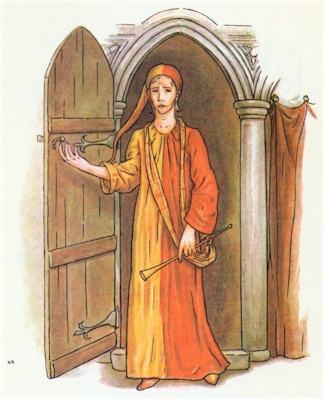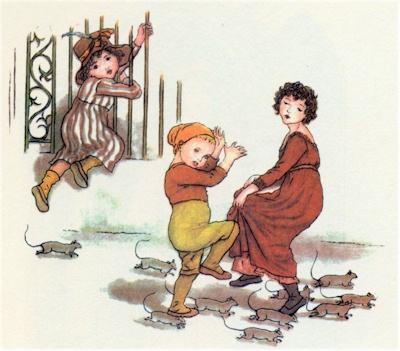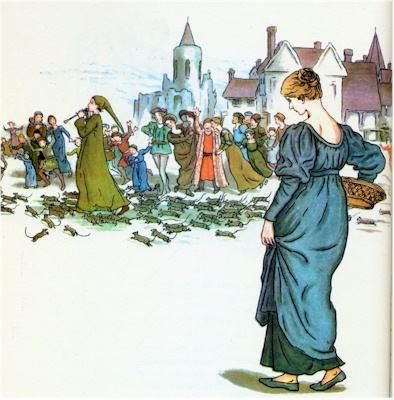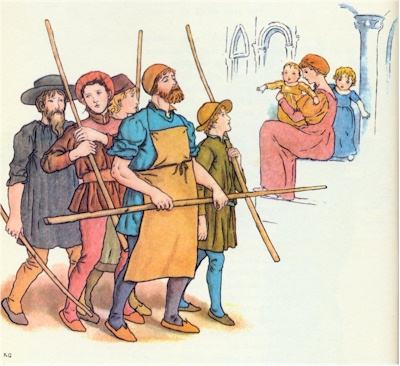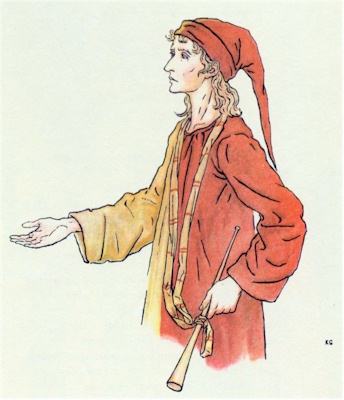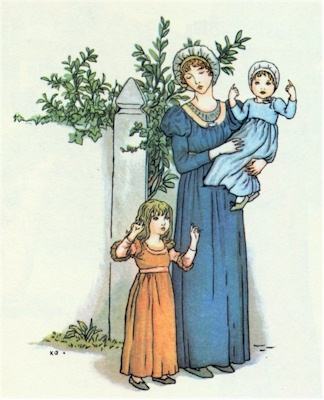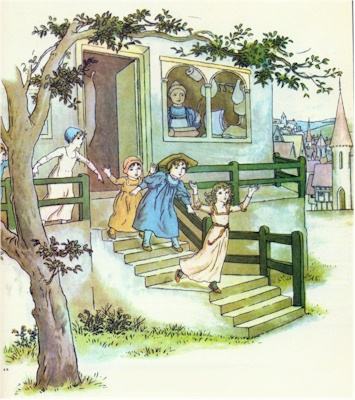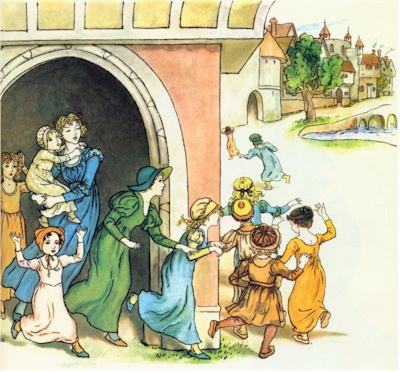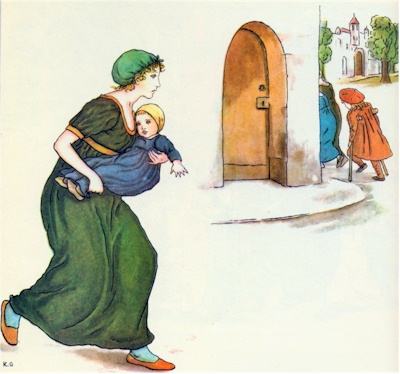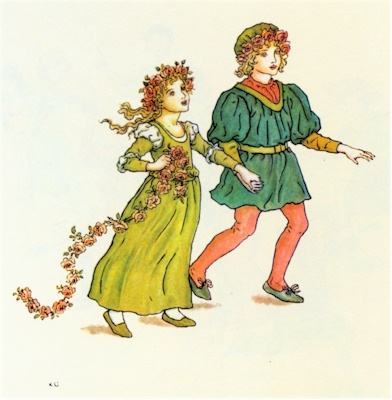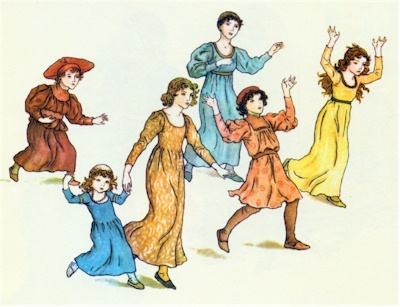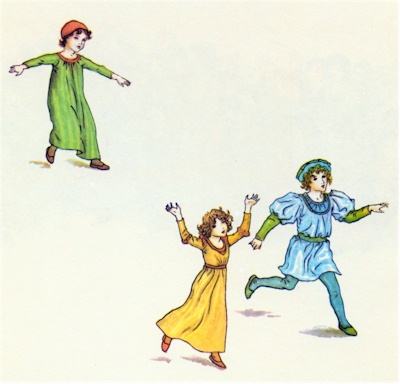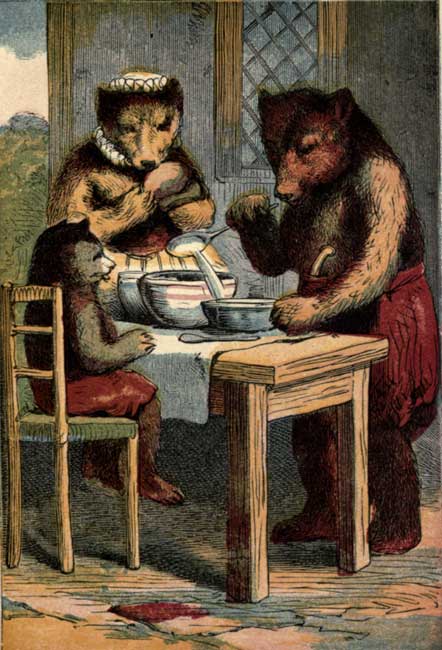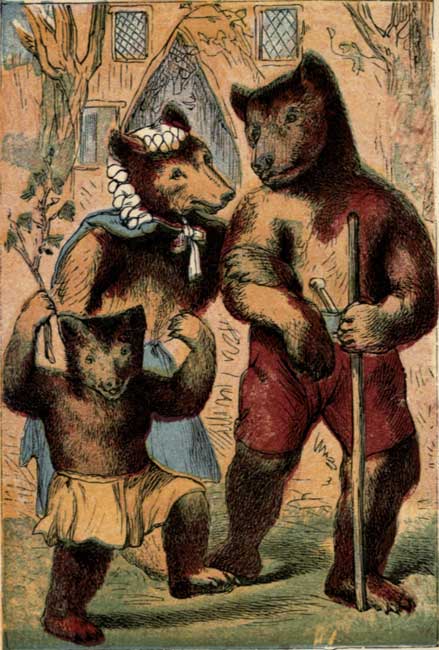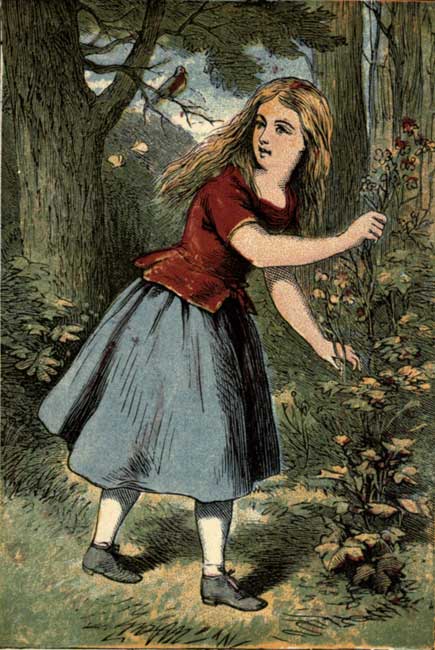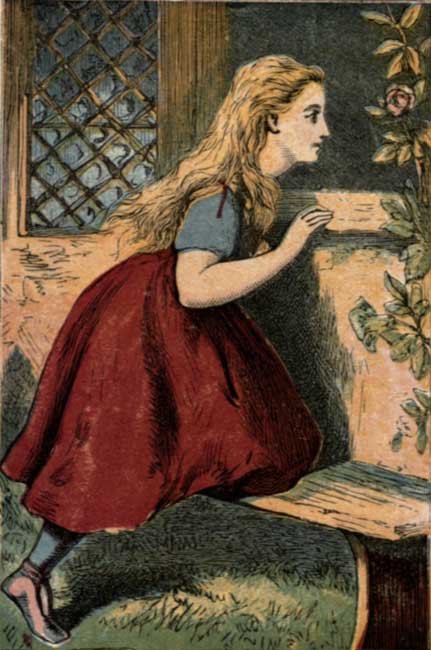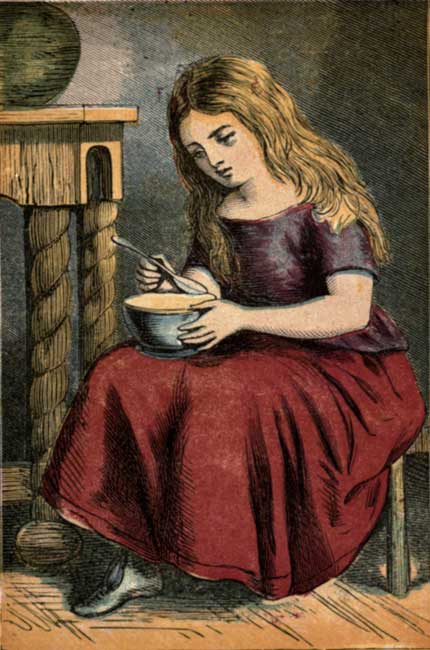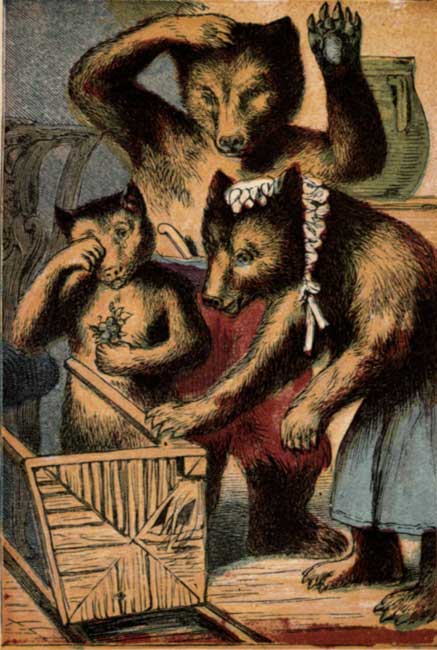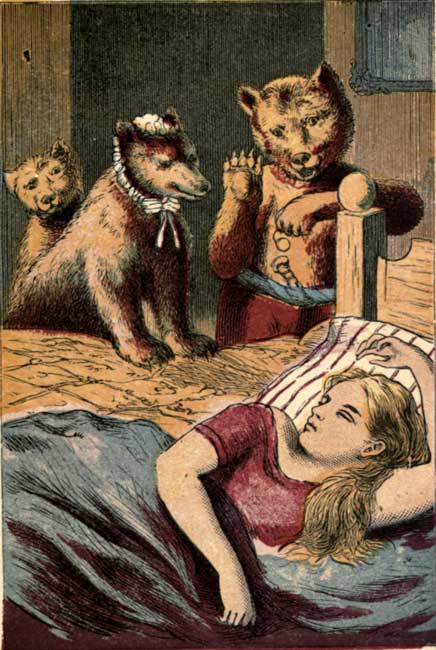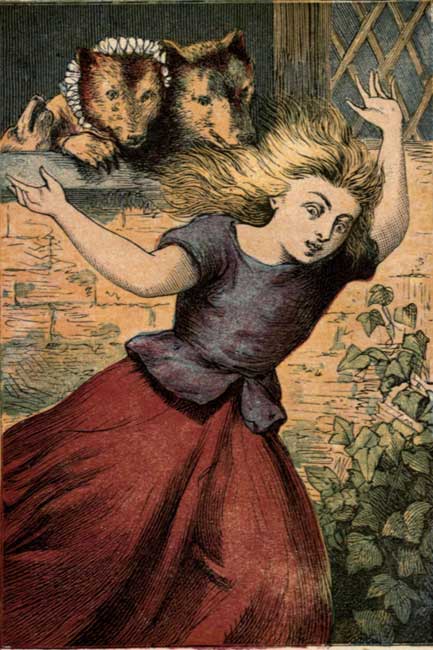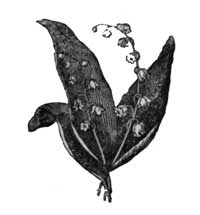BEAUTY AND THE BEAST
There was once a merchant who had been very rich at one time, but who, having had heavy losses, was compelled to retire to a little cottage in the country; where he lived with his three daughters. The two elder ones were very much discontented at their poverty, and were always grumbling and making complaints. But the youngest one, who was called Beauty, and who was as amiable as she was handsome, tried all she could to comfort her father and make his home happy.
Once, when he was going on a journey to try and mend his affairs, he called them around him, and asked them what he should bring them when he returned. The two elder ones wanted each a number of nice presents; but Beauty, kissing him sweetly, said she would be content with a rose. So when the merchant was on his way back, he came to an elegant garden, of which the gate stood open; and thinking of Beauty's rose, he went in, and plucking a beautiful one, prepared to proceed on his journey.
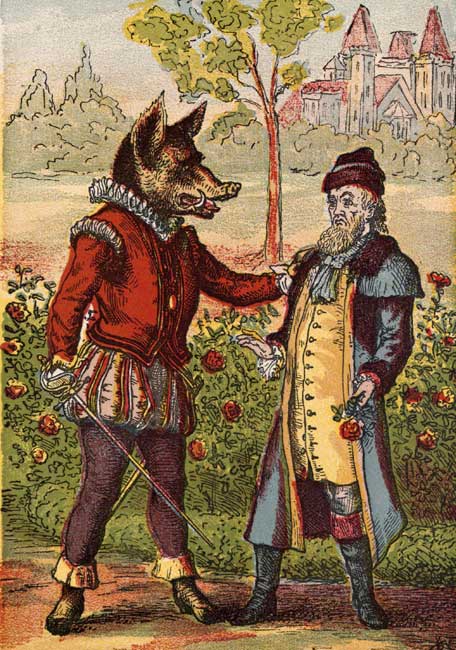 The Merchant and the Beast.
The Merchant and the Beast.As he turned to go, he saw a hideous Beast coming towards him, armed with a sword! This terrible creature reproached him for stealing his flowers, of which he was very choice; and threatened to kill him on the spot! The merchant begged for his life, and said, that he had only taken “a single one to please his daughter Beauty.” On this, the beast said gruffly, “well, I will let you off, if you will bring one of your daughters here in your place. But she must come here willingly, and meanwhile you may stay and rest in my palace until to-morrow.” But, as you may well believe, the poor father did not feel much like eating or sleeping; although everything was done for his comfort, and, in the morning, the Beast sent him home upon a beautiful horse. But though the birds sang around him, and the sun shone brightly, and all nature was smiling on his path, the heart of the poor merchant was heavy, when he thought of his beloved daughters.
When he came near his home, his children came forth to meet him; but, seeing the sadness of his face, and his eyes filled with tears, they asked him the cause of his trouble. Giving the rose to Beauty, he told her all. The two elder sisters laid all the blame upon Beauty; who cried bitterly, and said that as she was the cause of her father's misfortune, she alone must suffer for it, and was quite willing to go. So Beauty got ready for the journey at once. The father (who meant to return to the Beast himself, after embracing his children) tried to dissuade her, but in vain; and so the two set out together for the Beast's palace, much to the secret joy of the envious sisters.
When they arrived at the palace, the doors opened of themselves, sweet music was heard, and they found an elegant supper prepared. As soon as they had refreshed themselves, the Beast entered, and said in a mild tone, “Beauty, did you come here willingly to take the place of your father?” “Yes, sir,” she answered in a sweet but trembling voice. “So much the better for you,” replied the Beast. “Your father can stay here to-night, but he must go home in the morning.” The Beast then retired, giving Beauty so kind a look as he went out, that she felt quite encouraged. The next morning, when her father left her, she cheered his heart by telling him that she thought she could soften the Beast's heart, and induce him to spare her life. After he was gone, she entered an elegant room, on the door of which was written, in letters of gold, “Beauty's room.”
Lying on the table was a portrait of herself, set in gold and diamonds, and on the wall, these words: “Beauty is Queen here; all things will obey her.” Her meals were served to the sound of music; and at supper-time, the Beast after knocking timidly, would walk in and talk so amiably, that she soon lost all fear of him; and once when he failed to come, felt quite disappointed! At last, one night, he said to her, “Am I so very ugly?” “Yes, indeed, you are,” said Beauty, “but you are so kind and generous, that I do not mind your looks.” “Will you marry me, then, dear Beauty?” said the poor Beast, with a look of such eager entreaty in his eyes, that Beauty's heart melted within her, and she was upon the point of saying “Yes!”
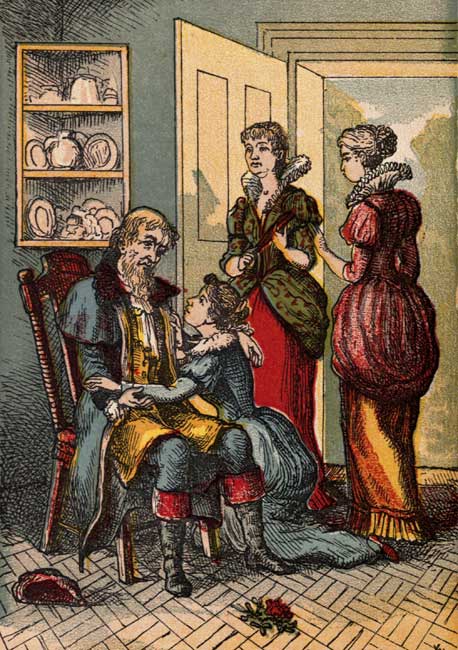 Beauty takes her Fathers place.
Beauty takes her Fathers place.But happening to look towards him, at that moment her courage failed her, and, turning away her head, she replied softly, “Oh! do not ask me.” The Beast then bade her good-night, with a sad voice, and went away sighing as if his heart would break. The palace was full of rooms, containing the most beautiful objects. In one room she saw a numerous troupe of monkeys, of all sizes and colors. They came to meet her, making her very low bows, and treating her with the greatest respect. Beauty was much pleased with them, and asked them to show her about the palace. Instantly, two tall and graceful apes, in rich dresses, placed themselves, with great gravity, one on each side of her, while two sprightly little monkeys held up her train as pages. And from this time forth they waited upon her wherever she went, with all the attention and respect, that officers of a royal palace are accustomed to pay to the greatest Queens and Princesses.
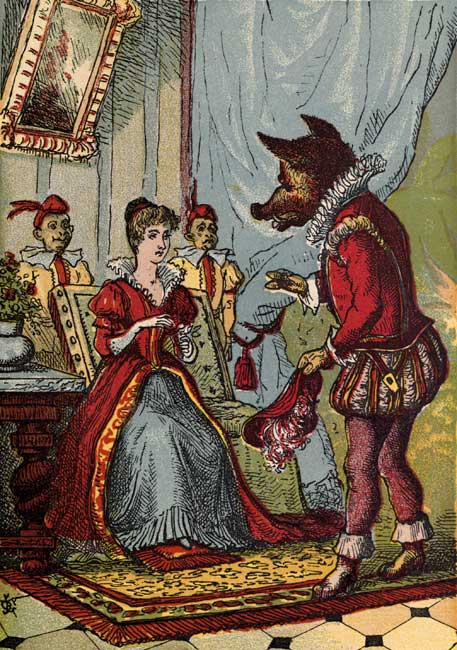 Am I so very ugly.
Am I so very ugly.In fact, Beauty was the Queen of this splendid palace. She had only to wish for anything to have it; and she would have been quite contented if she could have had some company; for, except at supper-time, she was always alone! Then the Beast would come in and behave so agreeably, that she liked him more and more. And when he would say to her “dear Beauty will you marry me?” in his soft and tender way, she could hardly find it in her heart to refuse him.
Now, although Beauty had everything that heart could wish, she could not forget her father and sisters. At last, one evening she begged so hard to go home for a visit, that the Beast consented to her wish, on her promising not to stay more than two months. He then gave her a ring, telling her to place it on her dressing-table, when she wished either to go or return; and showed her a wardrobe filled with the most elegant clothes, as well as a quantity of splendid presents for her father and sisters.
The poor Beast was more sad than ever, after he had given his consent to her absence. It seemed to him as if he could not look at her enough, nor muster courage to leave her. She tried to cheer him, saying, “Be of good heart, Beauty will soon return,” but nothing seemed to comfort him, and he went sadly away.
Beauty felt very badly when she saw how much the poor Beast suffered. She tried, however, to dismiss him from her thoughts, and to think only of the joy of seeing her dear father and sisters on the morrow. Before retiring to rest, she took good care to place the ring upon the table, and great was her joy, on awaking the next morning, to find herself in her father's house, with the clothes and gifts from the palace at her bed-side!
At first she hardly knew where she was, for everything looked strange to her; but soon she heard the voice of her father, and, rushing out of the room, threw her loving arms around his neck. Beauty then related all the kindness and delicacy of the Beast toward her, and in return discovered that he had been as liberal to her father and sisters. He had given them the large and handsome house in which they now lived, with an income sufficient to keep them in comfort.
For a long time Beauty was happy with her father and sisters; but she soon discovered that her sisters were jealous of her, and envied her the fine dresses and jewels the Beast had given her. She often thought tenderly of the poor Beast, alone in his palace; and as the two months were now over, she resolved to return to him as she had promised. But her father could not bear to lose her again, and coaxed her to stay with him a few days longer; which she at last consented to do, with many misgivings, when she thought of her broken promise to the lonely beast. At last, on the night before she intended to return, she dreamed that she saw the unhappy beast lying dead on the ground in the palace garden! She awoke, all trembling with terror and remorse, and, leaving a note on the table for her dear father; placed the ring within her bosom, and wished herself back again in the palace. As soon as daylight appeared, she called her attendants, and searched the palace from top to bottom. But the Beast was nowhere to be found! She then ran to the garden, and there, in the very spot that she had seen in her dream, lay the poor Beast, gasping and senseless upon the ground; and seeming to be in the agonies of death! At this pitiful sight, Beauty clasped her hands, fell upon her knees, and reproached herself bitterly for having caused his death.
“Alas! poor Beast!” she said, “I am the cause of this. How can I ever forgive myself for my unkindness to you, who were so good and generous to me, and mine, and never even reproached me for my cruelty?”
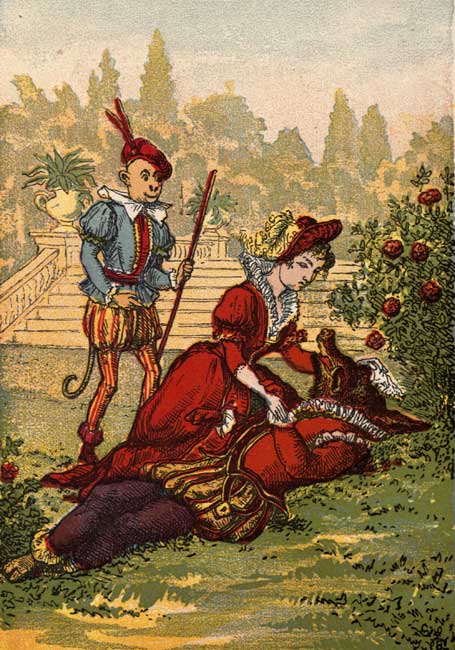 The Beast Dying.
The Beast Dying.She then ran to a fountain for cold water, which she sprinkled over him, her tears meanwhile falling fast upon his hideous face. In a few moments the Beast opened his eyes, and said, “now, that I see you once more, I shall die contented.” “No, no,!” she cried, “you shall not die; you shall live, and Beauty will be your faithful wife!” The moment she uttered these words, a dazzling light shone around—the palace was brilliantly lighted up, and the air was filled with delicious music.
In place of the terrible and dying Beast, she saw a young and handsome Prince, who knelt at her feet, and told her that he had been condemned to wear the form of a frightful Beast, until a beautiful girl should love him in spite of his ugliness! At the same moment, the Apes, and the Monkeys, who had been in attendance upon her, were transformed into elegantly dressed ladies and gentlemen, who ranged themselves at a respectful distance, and performed their duties, as Gentlemen, and Maids of Honor. The grateful Prince now claimed Beauty for his wife; and she who had loved him, even under the form of the Beast, was now tenfold more in love with him, as he appeared in his rightful form. So the very next day, Beauty and the Prince were married with great splendor, and lived happily together for ever after.

